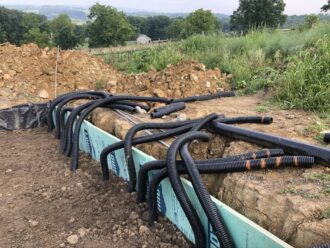Multiple Northeast SARE (Sustainable Agriculture Research and Education) grant recipient Tommye Lou Rafes, of T.L. Fruits and Vegetables in West Virginia, is sharing her experiences to help other farmers experiment with new ideas through the Farmer Grant program.
At noon on October 4th, 2022, Rafes will join Northeast SARE Grant Coordinator Candice Huber for an informational webinar to assist farmers interested in applying for up to $30,000 in funding for projects beginning in March 2023. Registration is required and participants are encouraged to submit questions ahead of the event. The Call for Farmer Grant Proposals is currently available and the online system for submitting applications is opening soon. Applications are due November 15, 2022.
Northeast SARE Farmer Grants are perfect for farmers looking to grow through new practices. Rafes first learned about SARE while attending a Good Agricultural Practices (GAP) training.
One of the professors hosting the meeting was a SARE reviewer who invited the attendees to apply for a grant.
“She said ‘You guys are all farmers, and no one has applied for this round of SARE grants… it sure would be nice if someone had a problem that needed to be solved.’” Rafes said.
“So, I’m sitting in this meeting and thinking ‘well, gosh, I could do that!’. I’m a retired science teacher, I used to have 180 students a year. And we had a science fair. And I was in charge of the science fair. The scientific method is something I was comfortable with.”
Rafes knew sustainable practices like using renewable-powered high tunnels to extend growing seasons could be good for business as well as the planet.
“The demand for my produce increased during the winter months,” Rafes said. “I was getting $2 a pound for green beans in the summer months. I could get $5 a pound in the winter… because no one else in my area was growing produce.”
Rafes saw that providing access to fresh produce in winter months could also benefit her community, improving vegetable intake to help curb obesity. She also saw that many of the high tunnels in her state were being underutilized during the winter months. She used her first Northeast SARE grant to help her fellow farmers make the most of their farms’ infrastructure.
“Growing in the winter months is a completely different way than you do in the summer months,” she said. “I decided to test varieties that were successful during the winter months as well as growing conditions that could be improved so that people would be more successful.”
T.L. Fruits and Vegetables is a women-run farm where Rafes and other retirees have formed a community around a big table where they share meals made from the food they grow together.
“I just think it’s a real rewarding life being a farmer. I don’t know that we make a lot of money, but it’s a very rewarding life. It’s a very healthy life.”
In addition to fostering a community of new farmers, Rafes has continued to use her farm to try new solutions and share what she learns through Northeast SARE Farmer Grants.
One thing Rafes has learned is that sustainable farming practices don’t have to be expensive to implement or maintain, especially if they are integrated into new infrastructure. Her most recent grant project explored using geothermal energy in high tunnels.
“Putting geothermal in after you have a house or a high tunnel would be difficult, but I don't understand why we're not using it as a country,” she said. “This should be something that should be a requirement. Once you have the infrastructure in, it's free and easy to use.”
Grant Coordinator Candice Huber says Farmer Grants are an opportunity for farmers to try things that could improve their operations.
“If you have an idea and you need resources to really explore it, a Farmer Grant can connect you with those resources,” she said.
